Domestic gasoline and diesel prices are to drop NT$0.1 and NT$0.2 per liter respectively this week, despite international crude oil prices rising last week as the situation in the Middle East remained tense, CPC Corp, Taiwan (CPC, 台灣中油) and Formosa Petrochemical Corp (台塑石化) said in separate statements yesterday.
After Iran launched a large barrage of missiles against Israel on Tuesday night and Israel vowed to retaliate, fears that escalating tensions between the two nations could spark a wider Middle East conflict sent global oil prices higher last week, the companies said.
US West Texas Intermediate crude oil rose 0.9 percent to settle above US$74 a barrel on Friday, soaring 9.1 percent in the week — the biggest weekly advance since March last year — while Brent crude increased 0.6 percent to US$78.05 per barrel, Bloomberg News reported on Saturday.

CPC said that based on its floating oil price formula, the cost of crude oil grew 0.86 percent last week from a week earlier.
The company said its gasoline and diesel prices should have increased by NT$0.6 and NT$0.7 per liter respectively, but that it would absorb part of the cost increases and use a price stabilization mechanism to comply with a government policy of keeping domestic fuel prices lower than in major neighboring markets.
Formosa matched CPC’s price adjustments after accounting for factors such as global oil market trends, the exchange rate for the New Taiwan dollar and fierce domestic market competition, it said.
Effective today, gasoline prices at CPC and Formosa stations are to decease to NT$29, NT$30.5 and NT$32.5 per liter for 92, 95 and 98-octane unleaded gasoline respectively, the companies said.
Premium diesel would cost NT$27.5 per liter at CPC stations and NT$27.3 at Formosa pumps, they said.

Nvidia Corp CEO Jensen Huang (黃仁勳) is expected to miss the inauguration of US president-elect Donald Trump on Monday, bucking a trend among high-profile US technology leaders. Huang is visiting East Asia this week, as he typically does around the time of the Lunar New Year, a person familiar with the situation said. He has never previously attended a US presidential inauguration, said the person, who asked not to be identified, because the plans have not been announced. That makes Nvidia an exception among the most valuable technology companies, most of which are sending cofounders or CEOs to the event. That includes

TARIFF TRADE-OFF: Machinery exports to China dropped after Beijing ended its tariff reductions in June, while potential new tariffs fueled ‘front-loaded’ orders to the US The nation’s machinery exports to the US amounted to US$7.19 billion last year, surpassing the US$6.86 billion to China to become the largest export destination for the local machinery industry, the Taiwan Association of Machinery Industry (TAMI, 台灣機械公會) said in a report on Jan. 10. It came as some manufacturers brought forward or “front-loaded” US-bound shipments as required by customers ahead of potential tariffs imposed by the new US administration, the association said. During his campaign, US president-elect Donald Trump threatened tariffs of as high as 60 percent on Chinese goods and 10 percent to 20 percent on imports from other countries.

Taiwanese manufacturers have a chance to play a key role in the humanoid robot supply chain, Tongtai Machine and Tool Co (東台精機) chairman Yen Jui-hsiung (嚴瑞雄) said yesterday. That is because Taiwanese companies are capable of making key parts needed for humanoid robots to move, such as harmonic drives and planetary gearboxes, Yen said. This ability to produce these key elements could help Taiwanese manufacturers “become part of the US supply chain,” he added. Yen made the remarks a day after Nvidia Corp cofounder and chief executive officer Jensen Huang (黃仁勳) said his company and Taiwan Semiconductor Manufacturing Co (TSMC, 台積電) are jointly

MARKET SHIFTS: Exports to the US soared more than 120 percent to almost one quarter, while ASEAN has steadily increased to 18.5 percent on rising tech sales The proportion of Taiwan’s exports directed to China, including Hong Kong, declined by more than 12 percentage points last year compared with its peak in 2020, the Ministry of Finance said on Thursday last week. The decrease reflects the ongoing restructuring of global supply chains, driven by escalating trade tensions between Beijing and Washington. Data compiled by the ministry showed China and Hong Kong accounted for 31.7 percent of Taiwan’s total outbound sales last year, a drop of 12.2 percentage points from a high of 43.9 percent in 2020. In addition to increasing trade conflicts between China and the US, the ministry said